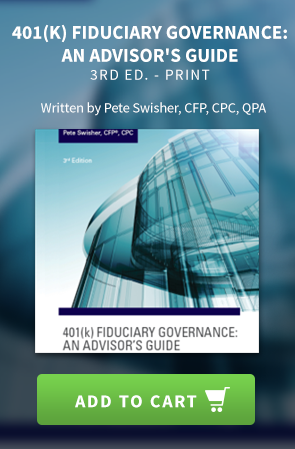457 Plans
The Department of Labor (DOL) on April 14 released proposed regulations redefining what it means to be a fiduciary under ERISA. The regulations raise many questions for many retirement plan professionals — including 403(b) and 457 advisors, as well as those who work with IRAs.In a new podcast on...
READ MORE
(Editor’s Note: Members will be interested to know that NTSA GAC and ASPPA GAC are working their way through the proposed regulations, and will plan to comment as appropriate. Note that the regulations are issued in proposed form only, and, following the comment period, would be finalized. NTSA...
READ MORE
The IRS recently updated the Employee Plans Compliance Resolution System (EPCRS), a means to correct plan defects. In this week’s MarketBeat, Michael Webb examines the changes made to EPCRS and discusses their specific impact (or lack thereof) on 403(b)/457(b) plan sponsors.
READ MORE
The ubiquitous coverage devoted to the big boys — 401(k)s and pension plans, as well as little brother 403(b)s — has occupied so prominent a place in the discussion of retirement plans that 457s garner much less attention. And yet, according to a recent report by the National Association of...
READ MORE
Time draws short for required minimum distributions (RMDs) from traditional IRAs and employer-provided retirement plans to taxpayers who reached age 70½ in 2014. The IRS on March 19 in IR-2015-55 issued a reminder that the deadline is April 1. The April 1 deadline applies to owners of traditional...
READ MORE
You’re one of the decision makers at your organization, and the nondiscrimination rules that apply to employer contributions to retirement plans don’t apply to you and your peers. If that describes you, then you are covered by a top hat plan. In this week’s MarketBeat, Ellie Lowder tells us how...
READ MORE
Some governmental plan sponsors, public school districts and public higher education organizations misinterpret how the federal income tax code applies to them. In this week’s MarketBeat, Michael Webb provides an overview regarding the sections of the tax code that do — and do not — apply to them.
READ MORE
If a government employee separates from service, would he need a recurring contribution in order to fall under the Code Section 401(a) special pay provision? In this week’s Tech Talk, Ellie Lowder tells us.
READ MORE
The NTSA is very pleased to announce that our persistent effort to ensure that public school employees receive the same important retirement plan information provided to private sector retirement plan participants, including fees, expenses and compensations, has passed a significant milestone: On...
READ MORE
It’s not unusual for questions to arise about options for the beneficiaries of 403(b) accounts, including non-spouse beneficiaries’ ability to “stretch” the distributions from the deceased’s account over the beneficiary’s lifetime. In this week’s MarketBeat, Ellie Lowder reviews the basics of...
READ MORE
A client who is being sued by her ex-husband for child support wants to claim financial hardship for legal fees. Would this qualify for hardship withdrawal? In this week’s Tech Talk, Ellie Lowder reviews the safe harbor rules for hardship withdrawals and tells us whether the ex-wife can make that...
READ MORE
It’s hurricane season, which brings handling emergencies into sharper relief. Under a 457(b) plan, a hardship distribution can only occur when the participant is faced with an unforeseeable emergency. An unforeseeable emergency is a severe financial hardship resulting from an illness or...
READ MORE
An agent with a product provider insists that an employee can take distribution from his 457(b) plan and roll it over into the same employer’s 403(b) plan; he is under 70 ½ and actively employed with that employer. The agent says there is new guidance making this permissible. In Tech Talk, Ellie...
READ MORE
If a client is age 72, and has worked for three years for an employer that offers a 457(b) plan, what are the rules regarding when he can retire with an unreduced benefit? In Tech Talk, Ellie Lowder explains what he needs to do and whether any catch-up contributions are possible.
READ MORE
According to research by ING, plan participants who use TDFs are more confident about meeting their retirement goals. They also defer more and are less stressed. In an online survey of more than 1,000 plans conducted last September by ING (which will be known as Voya starting in May), 54 percent of...
READ MORE
The IRS, in Notice 2014-19 and related FAQs, says clearly that retirement plans — including 403(b) plans — have to recognize same-gender spouses and spells out how. The notice and FAQs, which the IRS issued April 4, are a follow-up on Revenue Ruling (Rev. Rul.) 2013-17, which provided general...
READ MORE


